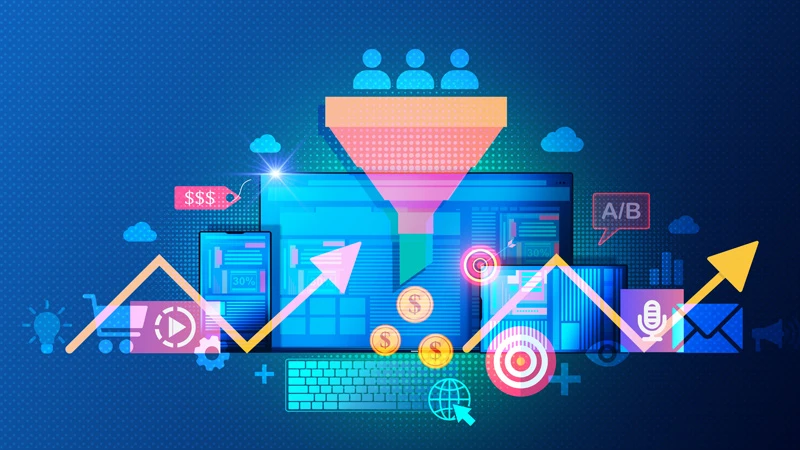Reinvent Your Organization: Just How AI Automation Is Transforming B2B Procedures
AI automation is reshaping B2B operations in significant methods. Companies are adopting this modern technology to improve operations and improve performance. As tasks end up being automated, businesses can concentrate on strategic growth as opposed to mundane processes. The ramifications of these changes are profound, affecting every little thing from customer interactions to supply chain administration. Recognizing this change is vital, as the future of business rest on the effective assimilation of AI into daily procedures. What exists ahead in this advancing landscape?
Understanding AI Automation in B2B Context
As services significantly seek efficiency, comprehending AI automation within the B2B context becomes essential. AI automation describes the application of fabricated knowledge innovations to simplify and improve company processes. In B2B environments, this can manifest in different types, such as automating information entry, optimizing supply chain logistics, or enhancing inventory administration. Organizations leveraging AI automation can reduce functional costs, reduce human error, and increase productivity. Additionally, AI devices can examine substantial quantities of data to provide actionable insights, enabling educated decision-making. B2B Automation Consulting. The combination of AI into B2B operations not just transforms conventional operations yet also promotes dexterity and scalability, permitting companies to adjust to market adjustments swiftly and efficiently. Accepting this innovation is important for staying affordable in today's digital landscape
Enhancing Client Experience Through AI
How can AI transform customer interactions in the B2B market? AI improves consumer experience by giving personalized, prompt, and effective solution. Virtual assistants and intelligent chatbots can deal with queries 24/7, making certain customers receive immediate reactions. AI Automation For B2B. Predictive analytics allow services to expect client requirements, tailoring offerings accordingly. AI-driven platforms can analyze customer information, enabling targeted advertising and marketing strategies and boosted interaction. Furthermore, sentiment analysis devices examine client comments, helping companies tweak their services. By automating routine jobs, AI liberates personnels to focus on high-value interactions, fostering more powerful relationships. The assimilation of AI not just improves interaction yet additionally constructs trust and commitment, inevitably raising the overall consumer experience in the affordable B2B landscape

Streamlining Supply Chain Monitoring With AI
AI plays an essential duty in enhancing supply chain management via anticipating analytics and automated inventory control. By leveraging anticipating analytics, companies can anticipate need variations and change their operations as necessary. Automated inventory systems better improve efficiency by making certain stock degrees are maintained, lowering waste and enhancing total performance.
Predictive Analytics Benefits
While several organizations encounter challenges in handling intricate supply chains, predictive analytics uses a transformative option by leveraging vast quantities of information to anticipate trends and maximize operations. By assessing historical information along with real-time inputs, anticipating analytics makes it possible for business to identify patterns and prepare for future needs. This insight permits even more enlightened decision-making, enhancing efficiency and decreasing expenses. In enhancement, organizations can proactively resolve prospective disturbances by predicting supply chain bottlenecks and adjusting methods accordingly. The assimilation of anticipating analytics not only boosts inventory management however also cultivates more powerful partnerships with vendors and consumers through prompt reactions to market changes. Inevitably, the fostering of anticipating analytics equips companies to remain affordable in a significantly vibrant service setting.
Automated Supply Control
As companies progressively rely on predictive analytics to enhance supply chain procedures, automated inventory control emerges as a powerful ally in this initiative. By leveraging AI-driven modern technologies, firms can enhance accuracy in inventory tracking, decrease stockouts, and decrease excess stock. Automated systems analyze real-time data, allowing businesses to forecast need variations and readjust stock degrees accordingly. This not just enhances order fulfillment yet additionally boosts money circulation monitoring by decreasing holding costs. Additionally, AI can determine patterns in buying habits, making it possible for even more enlightened decision-making relating to distributor partnerships and procurement methods. Eventually, automated stock control not only improves functional effectiveness but additionally boosts customer complete satisfaction by ensuring item availability, strengthening its function as a vital component in modern supply chain monitoring.
Data-Driven Choice Making Powered by AI
In today's affordable landscape, organizations increasingly rely upon data-driven decision-making to boost operational performance and strategic planning. Synthetic intelligence plays a pivotal duty in this change by examining substantial amounts of data swiftly and precisely. AI algorithms identify patterns, fads, and anomalies that human experts might neglect, allowing services to make enlightened decisions based on real-time understandings. This ability permits companies to predict market shifts, maximize resource allowance, and tailor their offerings to customer requirements. Additionally, AI-driven analytics promote risk evaluation and monitoring, making sure that organizations can browse unpredictabilities properly. By leveraging these sophisticated tools, companies not just enhance their decision-making procedures however also acquire a competitive benefit in their particular markets, cultivating growth and innovation.
Automating Repeated Tasks to Increase Performance

Incorporating AI With Existing Business Procedures
When integrating AI with existing service processes, several organizations deal with difficulties. These obstacles typically stem from an absence of comprehending relating to how AI can enhance existing workflows. Effective combination requires a complete evaluation of existing B2B Growth Consulting operations to identify locations where AI can add worth. Organizations must also ensure that their groups are furnished with the essential abilities to utilize AI tools properly. On top of that, seamless integration hinges on the compatibility of AI innovations with heritage systems. Firms often find it useful to take on a phased strategy, piloting AI applications in certain departments prior to a wider rollout. This method permits for adjustments based upon preliminary responses, guaranteeing smoother shifts and making best use of the potential benefits of AI automation in boosting productivity and efficiency.
Future Patterns in AI Automation for B2B Companies
As B2B business look to the future, enhanced information analytics is readied to play a pivotal role in driving decision-making processes. Intelligent process automation will certainly likewise arise as a key pattern, simplifying procedures and enhancing effectiveness. These advancements assure to reshape exactly how organizations operate, eventually causing more agile and responsive companies.
Improved Data Analytics
While companies progressively count on data-driven choices, the function of AI in boosting information analytics is coming to be much more vital in B2B procedures. AI modern technologies promote the collection and analysis of huge datasets, enabling firms to reveal important insights that drive critical planning. Anticipating analytics powered by AI permits organizations to forecast market fads and customer actions with higher accuracy. Additionally, artificial intelligence formulas boost information interpretation, determining patterns that human analysts may neglect. This brings about even more enlightened decision-making and optimized resource allowance - Minarik AI. As B2B firms proceed to accept AI-driven analytics, they can anticipate better functional efficiency, improved customer experiences, and an affordable side out there. The future of data analytics in B2B pivots on integrating advanced AI capacities
Smart Refine Automation
Smart Process Automation (IPA) is positioned to change B2B operations by perfectly integrating AI modern technologies with traditional business processes. This cutting-edge method incorporates robotic process automation (RPA) with innovative AI capacities, enabling organizations to boost effectiveness and accuracy. Firms can automate recurring jobs, such as information entrance and billing handling, allowing workers to concentrate on critical efforts. IPA likewise leverages artificial intelligence and all-natural language handling, improving decision-making via real-time information analysis. As services progressively take on IPA, they can expect significant cost decreases and enhanced client experiences. Future patterns indicate an expanding reliance on IPA for scalability and versatility, placing companies to grow in an ever-evolving marketplace. Embracing IPA will be vital for preserving competitiveness in the electronic age.
Often Asked Concerns
What Industries Benefit Many From AI Automation in B2B Workflow?
Manufacturing, logistics, finance, and healthcare industries benefit most from AI automation in B2B operations. These industries take advantage of automation to enhance effectiveness, decrease costs, streamline processes, and boost decision-making with anticipating analytics and data-driven understandings.
Exactly How Can Local Business Implement AI Automation Effectively?
Tiny services can carry out AI automation efficiently by identifying repetitive jobs, choosing appropriate devices, integrating services progressively, educating personnel, and continuously evaluating performance to enhance procedures, making sure a smooth changeover and making best use of efficiency. Growth Systems For B2B.
What Are the Expenses Connected With AI Automation Application?
The costs connected with AI automation implementation typically consist of software purchase, framework upgrades, training team, continuous maintenance, and potential assessment costs. These expenditures can differ considerably based upon the range and complexity of the automation options chosen.
Exactly how Do I Gauge ROI From AI Automation Initiatives?
To gauge ROI from AI automation initiatives, one must assess cost savings, efficiency renovations, and earnings development against execution costs. Tracking essential performance signs gradually gives valuable understandings right into performance and total roi.
What Skills Are Needed to Manage AI Automation Projects?
Effective management of AI automation projects requires skills in project management, data evaluation, programming, and understanding AI technologies. Additionally, strong communication, analytic capacities, and adaptability are necessary for navigating the intricacies of such campaigns.
As services significantly look for performance, recognizing AI automation within the B2B context ends up being crucial. The combination of AI into B2B procedures not just changes standard workflows but additionally cultivates dexterity and scalability, enabling businesses to adjust to market modifications quickly and efficiently. While businesses significantly count on data-driven decisions, the duty of AI in improving information analytics is becoming more necessary in B2B procedures. Intelligent Refine Automation (IPA) is poised to revolutionize B2B procedures by flawlessly incorporating AI technologies with standard service procedures. Effective monitoring of AI automation projects calls for skills in task administration, data evaluation, programming, and recognizing AI innovations.